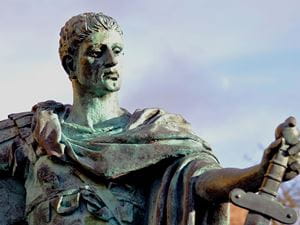
Prayer has existed for as long as mankind has had the slightest inkling that there might be some sort of higher power out there, and it might listen to what puny mortals have to say. People have prayed for rain, for victory in battle and for safety from invaders. They have asked for health, wealth and happiness. In addition to putting forth large requests such as healing from a disease, people have prayed for tiny things such as making a traffic light or help finding their chair and umbrella on a crowded beach. Everyone has heard that prayers are heard and answered, but not everyone gets to see instant and dramatic divine intervention. Most people get answers to their prayers in small or subtle ways that they, for whatever reason, credit to themselves. They simply remembered that their chair was beside that brightly color surfboard. Sometimes, however, prayers are answered in ways too extraordinary and impossible that there is no other explanation but that those prayers were heard.
The Battle of the Bulge
The Battle of the Bulge was one of the single bloodiest battles in American history. During the battle, 12,000 men were trapped and besieged at Bastogne in Belgium. When asked by the Germans to surrender in a very officially worded notice, United States Brigadier General Anthony McAuliffe simply replied “NUTS!” The German major was baffled and enraged, but Patton, already preparing to break the siege, reportedly stated that “a man that eloquent has to be saved.” Unfortunately, Patton’s rescue of the embattled troops was delayed by what had been a month of unrelentingly horrid weather. He only needed a 24 hour window of decent conditions to be able to send in the Third Army and reinforce the troops trapped by the Germans. After apparently cursing the clouds quite creatively, Patton gave Third Army chaplain Colonel James O’Neill what may have been the strangest orders he received in the war. Patton’s directive was for O’Neill to draft a prayer that would give Patton’s troops the break in the weather they needed to rescue their besieged brothers.O’Neill’s prayer was printed on hundreds of thousands of wallet sized cards and used by the Third Army. The prayer read, “Almighty and most merciful Father, we humbly beseech Thee, of Thy great goodness, to restrain these immoderate rains with which we have had to contend. Grant us fair weather for battle. Graciously hearken to us as soldiers who call upon Thee that, armed with Thy power, we may advance from victory to victory, and crush the oppression and wickedness of our enemies and establish Thy justice among men and nations.”
The prayer worked. The weather miraculously cleared, and Patton was able to reinforce Bastogne in what was called Patton’s finest hour. O’Neill was awarded the Bronze Star “for writing a prayer.” When O’Neill was asked about Patton’s reaction to his prayer’s success, O’Neill said Patton “cracked me on the side of my helmet with his riding crop. That was his way of saying, ‘Well done.’”
Dunkirk Evacuation
In May 1940, Adolf Hitler unleashed his troops against France and Belgium. The Allied troops in the Nazi’s path were surrounded by the Germans on three sides with the sea behind them. The Allies were trapped, and everyone knew it. German High Command boasted that their troops were “proceeding to annihilate the British Army,” and Prime Minister Winston Churchill was preparing himself to deliver the news that more than 300,000 soldiers had been captured or killed.Late that month, King George VI called for a National Day of Prayer. The British people devoted themselves entirely to prayer for the day. Congregations swelled and queues formed outside churches. At the same time, the military decided to evacuate all the soldiers it could. Unable to field enough military ships to carry all the endangered troops, a call went out asking for the aid of any vessel willing to cross the English Channel and assist in saving the trapped men. More than 800 vessels answered the call.
Even as the Allies raced to mitigate what seemed like a certain catastrophe, Hitler called his troops to a halt. For three days, Nazi tanks and soldiers stood idly by as the Allies frantically evacuated their men. At the same time, poor weather grounded the Luftwaffe and allowed Allied soldiers to reach the beaches, and the evacuation, without hindrance. The evacuation itself took place on unusually calm seas.
The “Miracle of Dunkirk” was just that, miraculous. To this day, historians are baffled as to why Hitler suddenly called a halt to his advance when victory was all but assured. The German generals themselves were clueless as to why they were not allowed to chase down and obliterate the Allies.
Battle of the Milvian Bridge
Prayer was not an active force in only recent wars. In A.D. 312, Flavius Valerius Constantinus battled Maxentius at the Milvian Bridge. The two men were warring over nothing less than who would control the entirety of the Roman Empire. Both prayed for victory in battle and a successful conquest.The night before the battle, Constantinus got an unexpected answer to his prayer. He dreamed that he was told to mark the sign of the then little-known Christian God on his soldier’s shields. Constantinus did so and bested Maxentius. Constantinus, better known today as Constantine, credited his victory to the Christian God and His Son, Jesus Christ. Constantine converted to Christianity and changed history forever.
Skeptics often scoff when people advise them to pray in response to their troubles, but prayer has been shown to alter history forever. Prayer can turn the tide of battle, allow for miraculous rescues and change the direction of one of the most powerful civilizations ever known. It can certainly help with the problems in an individual’s life. After all, most people do not carry the fate of thousands on their shoulders or fulfill a role that, whether they know it or not, will be remembered forever as directing the course of history.

